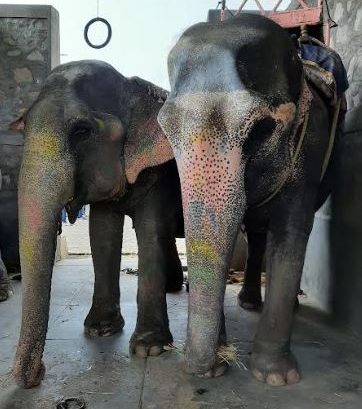On the occasion of World Environment Day, on 5th June, 2024, World Animal Protection is calling for responsible treatment of all animals, in the wild and in farms, so that their welfare and the protection of environment can be properly undertaken.
Elephants in Haathi Gaon in Jaipur Credit: Shubhobroto Ghosh
Recent research undertaken by World Animal Protection shows an estimated 5.5 billion wild animals being kept in cruel conditions on commercial wildlife farms around the world. Researchers have found an astonishing lack of transparency and inadequate monitoring across the global multi-billion-dollar industry, where sentient animals are treated as mere components in a cruel production line. Shockingly, some captive wildlife populations are now larger than those living free.
Factory farming entails environmental damage Credit: World Animal Protection
Case studies in the report detail some of the industries where urgent action is needed – including:
Bear farming in China – Some 20,000 bears are farmed for their bile on dozens of farms to satiate the demand of the bear bile industry in the country.
Elephant breeding in Thailand – The majority of nearly 3,000 elephants in the country are bred in captivity and used in 246 venues for tourism. Between 2010 and 2020, the number of elephant venues increased by a staggering 134 per cent.
Lion and other big cat farming in South Africa – Approximately 8,000 big cats are bred at 366 known facilities in the country and used for multiple purposes including for tourist entertainment, trophy hunting and body parts exports to Asia for traditional medicine.
While some wildlife trade and wildlife farming practices are legal, researchers have now started questioning the impact of legal wildlife trade on conservation and animal welfare. World Animal Protection notes with concern the rise in the trade of exotic animals in India and implores all law enforcement agencies to bolster efforts to tackle this trade.
Several notable influencers are advocating the end of the usage of wildlife in entertainment in India and abroad. The recent incident of an elephant collapsing in Jaipur due to the ongoing heatwave shows that the activity is fundamentally cruel and untenable. Elephants are wild animals with a significant role in maintaining the ecology of the area they inhabit. Removing them from their natural habitat constitutes not only cruelty to the individual animals being captured, but also affects the environment they share with other animals.
World Animal calls for the riding elephants of Amer Fort and Haathi Gaon to be retired to wildlife friendly sanctuaries following a proper protocol. World Animal Protection also insists that any transfer of elephants from one region to another adheres to legal guidelines and is undertaken with proper due diligence.
Since the highlight of World Environment Day 2024 focuses on land restoration, halting desertification and building drought resilience, it is pertinent to state that factory farming processes involving the mass rearing of animals in intensive conditions harms the environment and is detrimental to animal welfare and human health. Numerous studies across the world have established that intensive animal rearing in pristine forest habitat destroys the existent ecology of the area and damages the habitat of wildlife in the natural state while on the other hand forests are being cleared to grow feed for these farmed animals leading to dislocation of wildlife resulting in human-animal conflict. Such practices also employ corrupt practices of big multinational corporations with scant regard for the welfare of local people and concern for the environment. These activities, combined with effects of climate change that have given rise to expanding desertification have now been widely regarded as undesirable for sustainable growth, human and animal wellbeing and environmentally responsible practices.
“World Animal Protection is working to transform the food system by prioritizing respect for animals and nature. We envision a food system that is equitable, sustainable, resilient, and capable of feeding the global population. We encourage people to make responsible choices and shift towards plant-based protein options, benefiting animals, people, and the planet. This shift also helps protect wildlife and their habitats.
We call upon governments, corporations and individuals to help free wild animals from cruel exploitation, ensuring they thrive in abundant natural habitats that are humanely protected for the benefit of all living beings. This will help improve animal welfare, environmental protection, and wildlife conservation by addressing the destruction of natural habitats caused by intensive meat production.
Additionally, responsible food choices and wildlife protection measures align with the Prime Minister’s vision for a sustainable lifestyle under the LiFE (Lifestyle For Environment) initiative of the Ministry of Environment and Forests. So, let’s take a pledge on this occasion of World Environment Day to make responsible choices to protect animals and their habitats,” says Gajender Kumar Sharma, Country Director, World Animal Protection in India.
We are also witnessing the gratuitous use of antibiotics in poultry farming across the world, including in India which is leading to Antimicrobial Resistance (AMR) that is now a matter of real concern (our recent study on AMR).There is now considerable research, backed by expert opinion, that lessening meat consumption and replacing animal products with plant-based products is good for holistic health under the emerging concept of One Health, that encompasses animal welfare, human health and environmental protection. To this end, World Animal Protection recently participated in the 3rd Plant-Based Foods Summit of India organized by the Plant-Based Foods Industry Association (PBFIA) and presented by Ministry of Agriculture & Farmers Welfare, Government of India, The Agricultural and Processed Food Products Export Development Authority (APEDA), and Indian Chamber of Commerce. This was the third consecutive year of participating in this remarkable annual summit. It was a multifaceted presence, engaging investors, corporates & other attendees, proposing collaboration opportunities, and advocating for farm animal welfare within the Indian Food Industry. It is hoped activities like these will forward the cause of environmentalism currently espoused by the United Nations under the aegis of World Environment Day in 2024 and beyond.
For more information, please contact : Mr Gajender Kumar Sharma, Country Director, World Animal Protection gajenderksharma@worldanimalprotection.org.in

